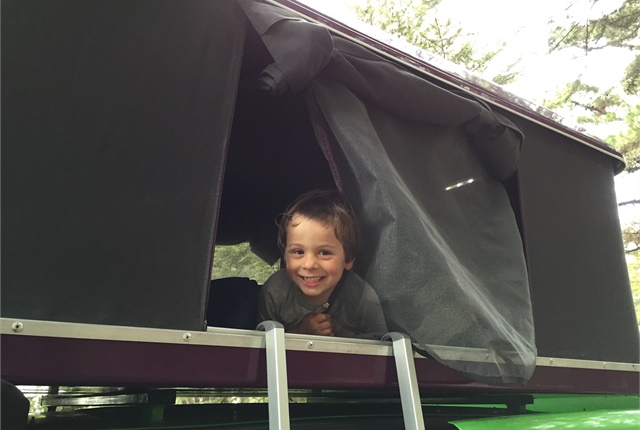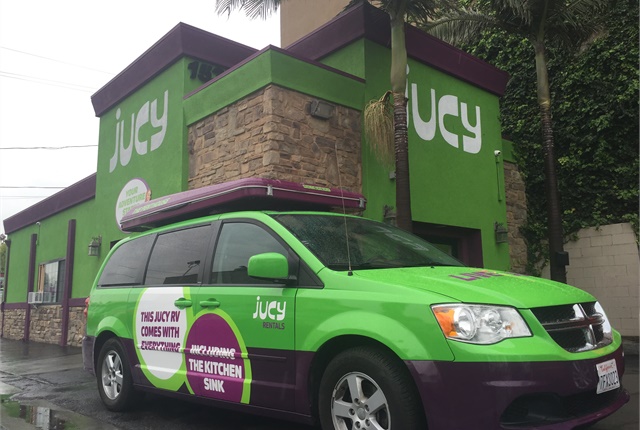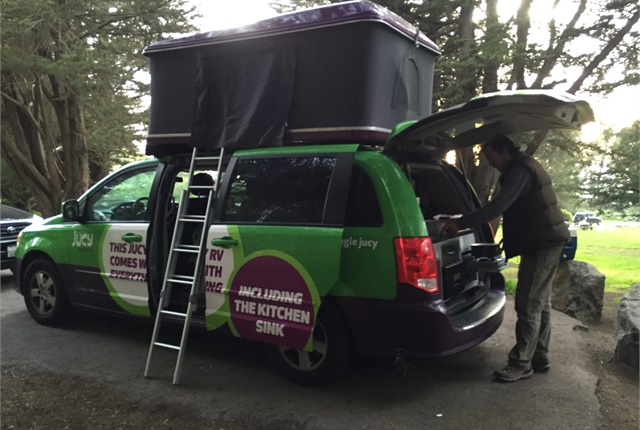Jucy Carves a Niche in U.S.
Survival in the U.S. as a smaller rental company depends on finding a niche and serving it well. Campervan rentals — ubiquitous in Australia and New Zealand — represent a fraction of the American RV rental market. Yet the niche is growing, thanks to a younger demographic and a few expat rental companies that have transplanted to the West.
Brothers Tim and Dan Alpe founded Jucy in New Zealand in 2001, expanded to Australia, and opened in the U.S. in 2012. Jucy rents 265 units out of three branches: Los Angeles, San Francisco, and Las Vegas, with 50 more on order. The company is looking to expand, potentially to other western cities such as Portland, Seattle, or Denver.
Zoe Macfarlane, Jucy’s U.S. vice president of marketing and business development, explains that in the U.S. there aren’t many options to camp between a tent and a standard RV. “People understand the concept better in New Zealand and Australia,” she says. “It’s a niche opportunity here, but there isn’t much in the way of competitors.”
Aimed more toward outdoorsy millennials than retired snowbirds, Macfarlane says campervan renters are exploring national parks and hitting the growing music festival circuit. The experience allows for more communing with the outdoors than a standard RV, yet avoids much of the tent camp setup hassles — and also the morning dew.
Jucy’s campervans start as used Dodge Caravan minivans and are then converted to mini RVs with beds, storage, dining table, and kitchen units. The vans have a rooftop cargo box that expands into a “penthouse” tent that sleeps two.
The storage and kitchen upfits are manufactured in New Zealand and shipped to the U.S. The penthouse comes from Italy. An employee had been traveling from New Zealand to do the conversions, though the company made the investment to move him to California a few weeks after the interview.
I recently embarked on a father-son camping adventure to Big Sur along California’s Central Coast. Our vehicle checkout was only a few minutes longer than a normal car rental walk around — unlike a larger RV rental, there isn’t much to explain. The van drives like the minivan it was born from, a plus for renters turned off by driving and parking a bigger rig.
The in-camp setup is nominal, a good thing considering the van is your primary mode of transport for off-campsite excursions of any length. The van’s inside converts to a table with two benches or a bed, while the liftgate reveals a compact kitchen with pump sink, small refrigerator, storage, and two burners.
In the U.S., Jucy’s high season runs May to September, though Macfarlane says business has picked up during the shoulder seasons. In April, Jucy’s Los Angeles location sold out of all 100 vans for Coachella, one of the country’s largest festivals, while drawing heavy utilization from Las Vegas and San Francisco.
Jucy does allow rentals to the Burning Man festival, held on a dry lake bed in northern Nevada known for its alkaline dust. Macfarlane says Jucy recently changed its cleaning policy from a non-negotiable flat $700 fee to discounting half if the van is brought back clean. “No one else in the market has that type of Burning Man policy,” she says.
Aside from Burning Man, it’s rare the company charges an excessive cleaning fee. The renters are asked to clean the dishes, empty the waste water, and fill up the gas tank.
Rates run similar to standard minivans but are “cost plus,” meaning base rate plus extras. The online options menu offers four damage waivers, four prepaid mileage packs, GPS and tech cables, and general camping items such as bedding, kitchen kits, camp chairs, and butane gas. These items are included in the lower base rate in the winter.
Rental hazards include misgauging the vans’ heights in parking structures and drive-thrus. Management verbally warns renters and puts a sticker in each cab, yet accidents happen. “If we need to replace a part on the penthouse, it comes from Italy; it’s very expensive,” Macfarlane says. The crank to raise the penthouse has a tendency to disappear as well.
The company hasn’t yet de-fleeted many vans in the U.S. and is still formulating its remarketing strategy. Macfarlane has been hitting travel shows to gauge resale interest and is contemplating a niche marketing campaign.
In the secondary market, a Jucy van would compete with Volkswagen Eurovan camper models and similar conversions, which aren’t cheap — used ones with more than 100,000 miles regularly sell for $20,000 to $40,000. While standard RVs and trailers offer much more space and are cheaper due to plenty of used inventory, campervans are coveted for their versatility and “cool factor.”
The vans are “de-branded” of logos, and while the penthouse pod stays green and purple, the vans are repainted to their original color. The company is looking into vinyl wraps for easier de-fleeting and may convert some units back to minivans. The labor cost to convert the vans and de-fleet them is an added expense compared to traditional rentals, yet the possibility to sell into a high-demand market would keep holding costs low and boost profits.
Macfarlane is tasked with evolving the company’s marketing toward specific U.S. demands, which included re-launching the U.S. website in January.
In Australia and New Zealand, the primary market is international inbound travelers on “the trip of a lifetime.” In the U.S., “Our biggest growth area is domestic Americans doing long weekends or week breaks exploring their own backyards,” Macfarlane says. “A lot of the changes we’re making are about meeting the needs and demands of the U.S. traveler as much as (those from) Europe and Australia.”
Indeed, the green and purple branding and the pinup model on each van — reminiscent of a Vargas girl on a World War II bomber — perhaps plays the biggest role in marketing. (While a competitor makes the counterpoint to go incognito, we were approached by looky-loos at almost every stop of our camping trip but didn’t mind.)
The company relies on digital marketing in the form of Google AdWords, Yelp, and social media pages along with specific targets such as festivals and travel agencies. Jucy has gotten good word-of-mouth press in national publications such as The Washington Post and USA Today.
“Our job now is to make sure that marketing is on point to convert that interest into a sale,” Macfarlane says.
 |
Fonte: Auto Rental News



